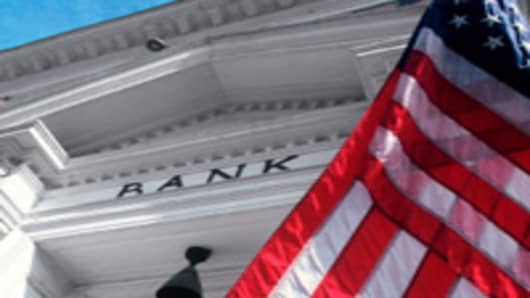For big banks like Citigroup, the first quarter of 2009 may turn out to be the best of the year.
Citigroup, JPMorgan Chase, Goldman Sachsand Wells Fargoall impressed investors over the past week with earnings reports that were better than Wall Street analysts anticipated.
The results showed Wall Street that its five-week-old rally was not in vain. Six weeks ago, Citigroup's chief executive Vikram Pandit and other bank CEOs ignited the rally by telling investors that January and February were profitable.
But the recent batch of reports did not change the widespread opinion that this year is going to be one of the toughest ever for the banking industry.
"There's life in this sector," said Gary Townsend, chief executive officer of Hill-Townsend Capital, but also "plenty of questions related to the sustainability of the results."
So after bank stocks' strong bounce in March and April, "they're probably due for a breather," said Fox Pitt Kelton banking analyst David Trone.
Loan losses are only going to get worse as unemployment rises. Citigroup saw some moderation in 30-day delinquencies in cards and mortgages, but its chief financial officer Ned Kelly warned: "One swallow does not make a spring."
When it comes to loan losses, "the elephant hasn't made its way through the python," Kelly said.
And the two biggest drivers offsetting loan losses at these banks were strong bond trading results and low borrowing rates. Borrowing rates are likely to stay low for a while, but they can't get much lower. And bank executives are not confident about keeping up trading revenues.
The first quarter saw a surge in corporate bond issuance as the credit markets started thawing from their frozen fourth quarter. JPMorgan Chase CEO Jamie Dimon said that it wasn't reasonable to expect record results to continue at its investment bank.
Citigroup's chief financial officer said the first quarter is historically the strongest for investment banking, and Goldman's chief financial officer, David Viniar, said the market is "still a dangerous environment."
Investors will get a better sense of how sick banks are in May, after the government finishes its "stress tests" designed to determined whether the companies would need more federal bailouts under various economic scenarios. Citigroup said Friday it is delaying the government's exchange of billions of dollars worth of preferred shares into common shares until the government completes its test.
Citigroup posted a first-quarter loss to common shareholders of $966 million, or 18 cents per share, narrower than the 34 cents analysts predicted, according to Thomson Reuters.
But before paying dividends to preferred stockholders tied to a private stock offering in January 2008, the bank earned $1.6 billion. Revenue doubled from a year ago to $24.8 billion.
A year ago, Citigroup suffered a loss of more than $5 billion, or $1.03 a share.
On Friday, Citigroup stock slipped 36 cents, or 9 percent, to $3.65.
Its credit costs were high at $10 billion, due to $7.3 billion in loan losses and a $2.7 billion increase in reserves for future loan losses. The credit costs stemmed mainly from consumers; the rate at which Citigroup had to write off their loans as unrecoverable more than doubled over the past year to 5 percent.
Also offsetting weakness was a $2.7 billion mark-up caused indirectly by investors growing more worried about the bank's creditworthiness. Those worries decreased the value of Citigroup debt on the market. So the credit derivatives on Citi's books — complex assets based on the value of debt — actually gained in value because technically, Citigroup owed other parties less.
To be sure, mark-downs are not hitting Citigroup as hard because the bank has reduced the investment bank's portfolio of risky assets to $101 billion from $227 billion over the past year.
But another reason is accounting. Citigroup has moved more of those risky assets into an "accrual" account. Accrual accounting measures assets as if the loans underlying them will be held to maturity, while fair-value accounting values assets based on their current market price.
Citigroup has been the weakest of the large U.S. banks, posting quarterly losses since the fourth quarter of 2007.
In early March, Citigroup stock hit an all-time low of 97 cents per share. It has since quadrupled, but remains down 40 percent for 2009 and down more than 93 percent from its late 2006 peak.
Since late 2007, Citigroup has gotten a new CEO, a new chairman, and a new structure that splits its traditional retail and investment banking business from its consumer finance units, asset management, and risky mortgage-related assets. It has also been downsizing by selling off businesses and laying off a fifth of its employees. And it has gotten $45 billion in government funding and a federal backstop on roughly $300 billion in assets.
Two more big banks report first-quarter earnings next week: Bank of America on Monday, and Morgan Stanley on Wednesday.


